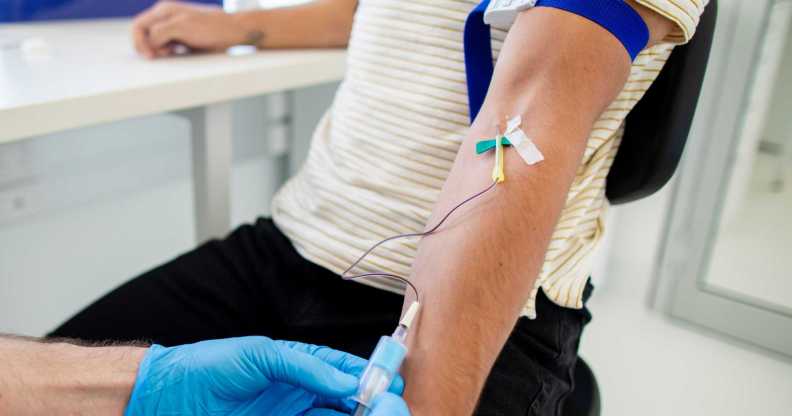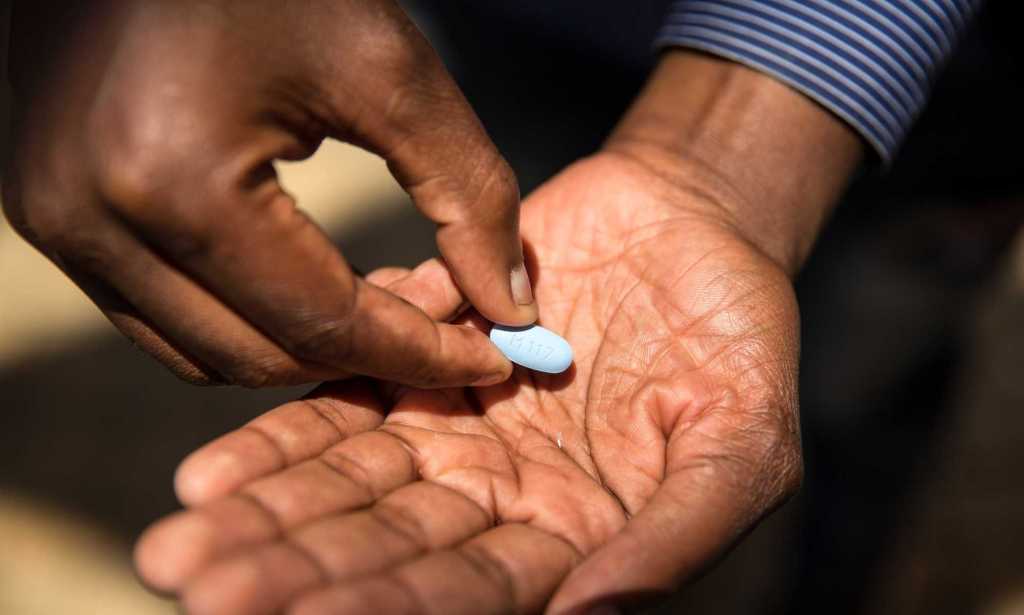Yes, gay and bi men can give blood – but face some additional rules. Here’s what you need to know

A 2023 report showed no evidence of issues since more gay and bisexual men have been able to donate blood. (Getty)
On July 25, the NHS issued a stark warning about blood stocks, after supplies of O-type blood dropped to “unprecedently low” levels in England.
The health service issued an appeal for people with O-type blood to come forward, however some gay and bisexual men are still unsure about the rules about blood donation in the UK. Google searches for “can gay people donate blood UK” spiked after the announcement. We’re here to help: here are the latest rules.
Can gay and bi men donate blood?

In short, yes. In December 2020, the British government announced that it would bin the ban – first fully instigated in 1980 during the HIV/Aids crisis – on gay and bisexual men donating blood.
In June 2021, rules surrounding blood donation were changed. Before then, men could not donate within three months of sexual contact with another man.
Now, any men who have sex with men and are in monogamous long-term relationships, or have been with their sexual partner for more than three months, can donate blood.
The NHS rules state: “Men who have sex with men and who have had the same partner for 3 months or more and meet our other eligibility criteria are able to give blood.
“Anyone who has had anal sex with a new partner or multiple partners in the last three months, regardless of their gender or their partner’s gender, must wait 3 months before donating.”
The NHS say that the 3-month wait is to “reduce the risk of any very recently acquired infections not being detected on screening and further tests. This applies to all donors whose partners may be at a higher risk of blood-borne infections.”
Donors are also asked questions about past sexually transmitted infections and any drug use during sex.
Ethan Spibey, the founder of pressure group FreedomToDonate, said at the time of the rule change: “We welcome a pioneering new policy and are immensely proud that more people than ever will be able to fairly give the life-saving gift of blood.
“Simply being a man who has sex with men is not a good enough reason to exclude someone from donating blood.”
Can you donate blood if you’re on PrEP?

Unfortunately not. Pre-exposure prophylaxis (or PrEP) is medicine taken to prevent getting HIV, and the NHS rules state: “If you are taking pre-exposure prophylaxis (PrEP) or post-exposure prophylaxis (PEP) you will be unable to give blood. If you stop taking PrEP or PEP, you will need to wait 3 months before you can give blood.”
Safety fears unfounded
There has been no impact on safety since UK rules changed to permit gay and bisexual men to donate blood, a NHS report revealed in October 2023.
Findings from the Safe Supplies 2022: monitoring safety in donors and recipients report, produced jointly by NHS Blood and Transplant and the UK Health Security Agency (UKHSA), showed there has been no impact on UK blood safety since rules surrounding donating changed in 2021.
According to the report, the residual risk of blood contaminated with a newly acquired hepatitis B, hepatitis C or HIV infection being released into the UK supply remained at less than one in a million.
The number of infections in donors remained low overall, and, where blood donations had markers of infection, the donors responded well to the For the Assessment of Individualised Risk (FAIR) questions about their sexual behaviour.
The report’s findings were described as “really encouraging” and a form of “reassurance of safety for recipients across the UK”, by Dr Su Brailsford, NHS Blood and Transplant’s interim clinical director of microbiology and public health, and the chairwoman of the FAIR steering group.
”As always, we are grateful to the donors who help save and improve recipient lives every year,” she added.
Katy Davison, a UKHSA epidemiologist, said: “We are able to show there are still very few infections in donors, and transmissions to recipients are rare. But we continue to keep a close eye on the impact of FAIR and gather evidence for future reviews of the policy.”
A separate study also published that year, the Serious Hazards of Transfusion report, found there were zero confirmed cases of transfusion-transmitted hepatitis B, hepatitis C or HIV during 2022.
How did this story make you feel?

